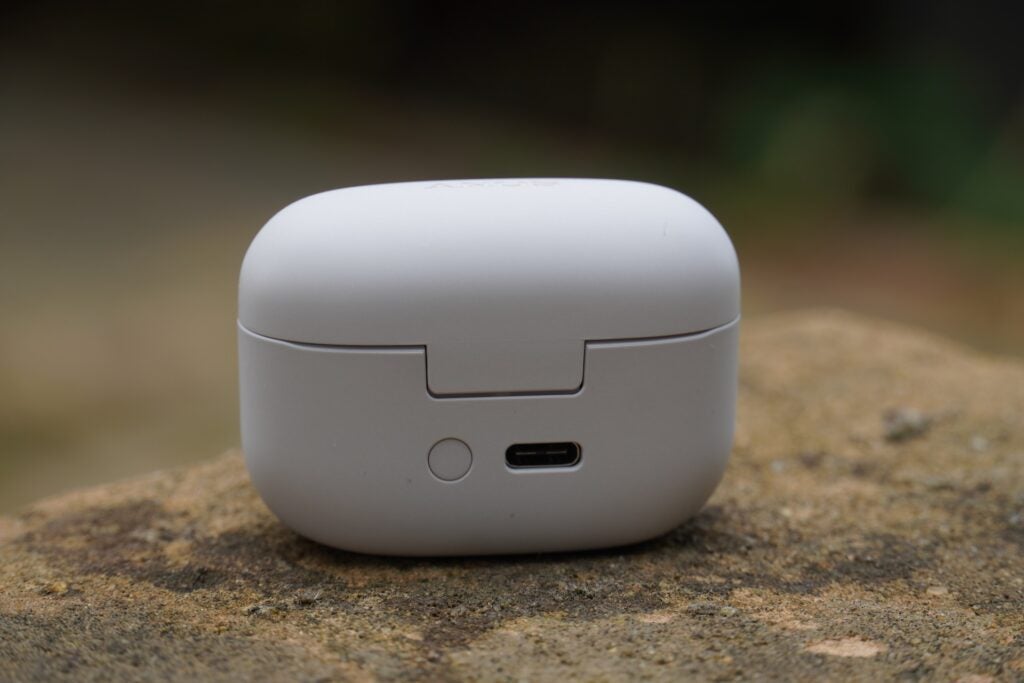Sony LinkBuds S Review
Sony expands its new true wireless range with the LinkBuds S


Verdict
Small in size and available at a more accessible price than the WF-1000XM4, if you’re after a more affordable pair of true wireless buds with good sound, extensive smarts and impressive noise cancellation, the LinkBuds S tick those boxes.
Pros
- Rich, expressive sound
- Impressive noise cancellation for the price
- Good comfort levels
- Compact, lightweight design
Cons
- Average battery life
- Mixed call quality performance
Availability
- UKRRP: £180
- USARRP: $199.99
- EuropeRRP: €200
- CanadaRRP: CA$299
- AustraliaRRP: AU$268
Key Features
- ProcessorNew V1 processor
- Hi-Res AudioLDAC Bluetooth for higher-quality audio
- Spotify TapQuick access to the music streaming service
Introduction
The LinkBuds S join the LinkBuds that arrived earlier in 2022 as part of Sony’s latest true wireless series.
The LinkBuds are open-eared wireless earphones that allowed the wearer to engage with the environment around them at all times; but the LinkBuds S go in the opposite direction, adopting a closed design while inlcuding noise cancellation and a Transparency mode.
At first glance that would make the LinkBuds S a miniature version of the WF-1000XM4, since both cover similar ground, and at launch were available at a similar price. But in recent months the LinkBuds S have been available at a discounted price, for as low as £129 from some places.
It’s best to think of the LinkBuds S as slightly smarter, more accessible buds for the casual market – and in terms of performance per pound, these true wireless are right up there.
Design
- Super-compact size
- Good fit and comfort
- Range of ear-tip sizes
Sony’s emphasis with the LinkBuds S is “all-day comfort”. They’re small, lightweight (4.8g per earbud) and, best of all, they’re pleasant to wear.
In my ears, after a while I can barely feel their presence; they’re similar in appearance to the WF-1000XM4, but less bulky. They come with a range of ear-tip sizes, XS to L, and I found the largest size fit me best. The medium option didn’t produce the tightest fit during general use or exercise, with the bigger size creating the best air-tight feel.

Touch controls are often maligned, but they’re responsiveness is a positive on the LinkBuds S, which use various taps and holds for operation, in a similar manner to the WF-1000XM4. Not all controls options are included by default, with a degree of chopping and changing required for what you’ll use most. Customisation is possible through the Headphones Connect app.
Build quality is tough enough. Like the WH-1000XM5, these buds are made from recycled plastics. However, an accidental drop on concrete did result in a small chip. Some sweat- or water-resistance protection comes by way of the IPX4 rating.

The case is ultra-compact and very pocketable, sporting a smooth, pebble-like finish that implies premium quality. There’s an LED light on the front that flashes different colours to show the current battery state, while around the back is a USB-C port. Available in three finishes, the LinkBuds S are available in a choice of black, white and cream.
Features
- Average battery life
- LDAC Bluetooth
- Very good noise cancellation
Overall battery life is actually less than the LinkBuds – 22.5 hours compared to 20 hours. The LinkBuds S edge the open-eared version with 6 hours per bud to 5.5 hours, but that means there are only two-and-a-bit charges from the case.
Having used them for an hour, battery life went down by 20%, with 90 minutes of use seeing another 10% chalked off; this suggest around 5 hours of stamina. That was with LDAC and noise cancellation on, so I imagine the AAC codec may have a less draining effect on the battery.
There’s no wireless charging, since Sony doesn’t believe the format is fast enough in terms of convenience (and I’m inclined to agree). However, you do get fast-charging, with five minutes providing an hour more playback.
Elsewhere, the feature set covers similar ground to the WF-1000XM4. Bluetooth is of the 5.2 standard with SBC, AAC and LDAC, the latter for handling high-quality wireless audio. Wireless performance is mostly good, with a few jitters when walking through Waterloo and Victoria station, but nothing to knock the LinkBuds S off their stride.
However, it was in a nearby park or strolling through Crystal Palace where the earphones unexpectedly lost contact for a brief moment. Nevertheless, they held on well in most places with the connection set to “Sound quality as priority” in the app.

Noise cancellation isn’t as silent as the WF-1000XM4, but the fit and seal of the design help to plug the ears to stop plenty of noises from intruding. The functionality minimises traffic, the hustle and bustle of people and heavily reduces the impact of environmental sounds.
I have still be able to hear a few noises filtering through, and depending on which ear-tip size you use, you may be able to rid more noises. Still, in my opinion, these are one of the best performing noise cancelling earphones at their price, better than either the Jabra Elite 7 Pro and Beats Fit Pro.
The Transparency mode is neither as clear nor detailed as the WF-1000XM4, to my ears denoting a step down in performance. But what you get still offers plenty of clarity and detail. There’s perhaps a little pick-up of noise – but, regardless, the LinkBuds S are pretty good, and I’d say a little better than the NuraTrue Pro.
Delve into the Sony Headphones Connect app and you’ll find a choice of built-in voice assistants in Google and Alexa, both of which are hands-free and respond promptly when they’re called upon. For tasks such as changing the volume or skipping, or finding out some information, either voice assistant provides convenience.

Spotify Tap opens up the music streaming service using simply a tap. You can assign which function to map to that press in the app (an album, a playlist and so on), but in my experience it took a while for the app to start.
Other smarts come in the Endel feature available in the Service Link area of the Headphones Connect app. It offers personalised soundscapes to help focus, relax and sleep (it seems Sony imagines you’ll rarely take these buds off). You can sample it for free, but the app is fee-based and requires being installed in a separate app on your mobile device.
Call quality can fluctuate. The person on the other end said my voice was isolated well during calls, although it did sound quiet. However, when something large went past, the LinkBuds S suppressed both that sound and my voice. When not faced with noise the earphones perform fine; when they do encounter noise, then they struggle a little, which isn’t unlike the WF-1000XM4.
Sound Quality
- Share characteristics with WF-1000XM4
- Rich, detailed mid-range
- Not the most expressive treble performance
The LinkBuds S and WF-1000XM4 are cut from the same cloth on the audio front – you could conceivably think of the LinkBuds S as the younger, smaller sibling. They share the same characteristics; the difference is that the WF-1000XM4 are able to stretch their legs with more detail, more dynamism and more subtlety.
They’re not the punchiest-sounding pair of wireless buds, at least not at normal volumes. Raise the volume and the LinkBuds S offer a more assertive and confident performance. Like the WF-1000XM4, their mid-range is a rich one, clear and detailed, a performance that emphasises and describes instruments in a slightly warm, expressive manner.

The soundstage is wide and spacious, and where the LinkBuds could only describe bass frequencies with little presence, the LinkBuds S deliver more weight and impact. With The Beatles’ Hey Jude they convince with their sense of timing across the frequency range, with a better balance than the LinkBuds and greater dynamism, too; the way in which they define instruments is more convincing.
Of the two, there’s no doubting that the LinkBuds S are the better-sounding model, and for some who felt the original LinkBuds lacked on the audio front, the S model rectify that.
Comparing Anette Askvik’s Liberty, both the XM4 and LinkBuds S take a similar approach. Both offer excellent definition of voices; the breathy intonations of the singer and the register of her voice is captured well by both. However, the XM4 grant voices more space and clarity. The top-end of the frequency range is good, but treble notes have less of a presence, definition and sharpness. I wouldn’t describe them as recessed, but they’re not as bright as perhaps some may want.

A listen of title track from the Moon Knight album, the WF-1000XM4 stretch away even further, bass has a bigger presence, which helps convey a better sense of dynamism where the LinkBuds S are slightly more reserved.
Compared to both the Jabra Elite 7 Pro and Beats Fit Pro, the Sony area step above for sound. The Jabra’s crisper, more neutral sound profile is good, but I prefer the Sony’s richer mid-range, stronger bass and, in terms of detail, the LinkBuds S are the more revealing pair. While the Beats Fit Pro are the crisper sounding of the two, they’re also more clinical in their sound. The Sony buds just sound more fun.
Latest deals
Should you buy it?
Good sound at a less premium price They don’t sound as good as the WF-1000XM4, but that’s reflected in the price. If you’re a more casual user rather than an audiophile, the LinkBuds S are the better option for their more accessible price.
If you want the best performance The sound and noise cancelling is bettered by other true wireless, but you’ll need to look around the $200 / £200 to find a big improvement on them.
Final Thoughts
It’s tricky not to think of the LinkBuds S as a smaller version WF-1000XM4. They share a similar design, the same feature set and similar audio performance as well. The difference is that the WF-1000XM4 are more for the audiophile, whereas the LinkBuds S seem best suited to the more casual crowd.
If outright high fidelity sound isn’t what you’re after, then the LinkBuds S offer impressive noise cancellation and a convenient design for less money. If you can get them for less than $150 / £150 then the LinkBuds S are something of a bargain.
How we test
We test every headphones we review thoroughly over an extended period of time. We use industry standard tests to compare features properly. We’ll always tell you what we find. We never, ever, accept money to review a product.
Find out more about how we test in our ethics policy.
Tested for two weeks
Tested with real world use
FAQs
Along with a transparency mode to let sounds in, the LinkBuds also come with noise cancellation to block sounds.
Full specs
Sustainability
Trusted Reviews’ holds the fact that global warming is not a myth as a core value and will continuously endeavour to help protect our planet from harm in its business practices.
As part of this mission, whenever we review a product we send the company a series of questions to help us gauge and make transparent the impact the device has on the environment.
We currently haven’t received answers to the questions on this product, but will update this page the moment we do. You can see a detailed breakdown of the questions we ask and why in our sustainability info page.








